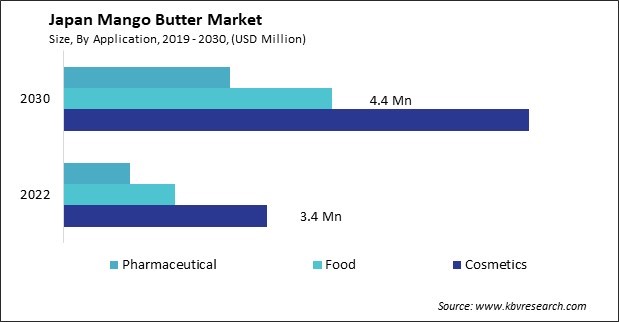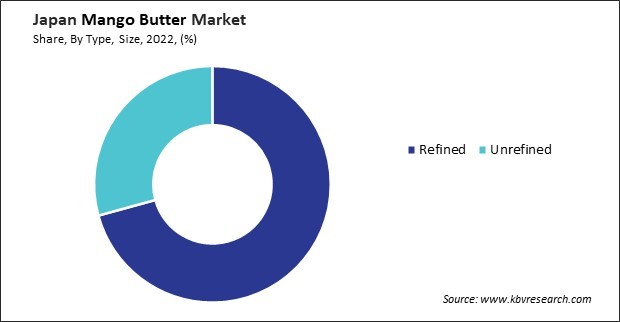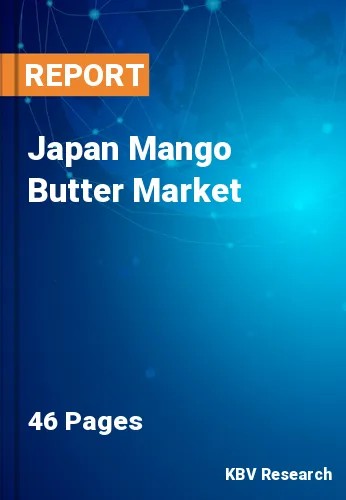The Japan Mango Butter Market size is expected to reach $14.9 Million by 2030, rising at a market growth of 11.4% CAGR during the forecast period. In the year 2022, the market attained a volume of 182.76 Tonnes, experiencing a growth of 11.9% (2019-2022).
The mango butter market in Japan has witnessed a steady rise in recent years. One of the key drivers of the mango butter market in Japan is the rising demand for natural and organic skincare products. Consumers in Japan are becoming more discerning about the ingredients in their skincare products, preferring those derived from natural sources over synthetic chemicals. Mango butter, being a natural product, aligns well with this trend and has gained popularity among Japanese consumers seeking skincare solutions that are both effective and environmentally friendly.

Additionally, the influence of Japanese culture and traditional skincare practices has contributed to driving the demand for mango butter. In Japan, there is a long-standing tradition of using natural ingredients in skincare rituals, rooted in the belief that healthy skin starts with nourishing it from the inside out. With its rich moisturizing properties, Mango butter fits well into this cultural context and has been embraced by Japanese consumers as a valuable addition to their skincare routines.
Moreover, the pharmaceutical industry in Japan is exploring the use of mango butter in dermatological formulations. Mango butter exhibits excellent moisturizing properties, making it suitable for treating dry skin conditions such as eczema and psoriasis. According to the Japan Ministry of Health, Labour and Welfare (MHLW), the Japanese pharmaceuticals industry in 2021 totaled $106 billion. Pharmaceutical companies in Japan are investigating the incorporation of mango butter into creams, lotions, and ointments for these purposes.
However, COVID-19 has had a significant impact on the mango butter market in Japan. The pandemic led to disruptions in supply chains and distribution channels, affecting the availability of mango butter-based products in the industry. Additionally, changing consumer priorities and financial constraints resulted in fluctuations in demand for skincare products, including those containing mango butter. As the world emerges from the pandemic, the mango butter market in Japan is expected to regain momentum, driven by continued consumer interest in natural and sustainable skincare products.
The cosmetic industry in Japan has experienced significant growth, with a notable surge in the utilization of mango butter as a key ingredient. Mango butter, derived from the kernels of mango fruit, has gained traction due to its rich moisturizing properties and numerous skin benefits. As Japanese consumers increasingly prioritize natural and sustainable skincare solutions, mango butter has emerged as a favored ingredient, aligning with the demand for clean beauty products.
One of the primary factors driving the expansion of the cosmetic industry in Japan is the cultural emphasis on skincare and beauty rituals. According to the International Trade Administration, in 2019, Japan's cosmetics and personal care products industry reached a substantial industry size of approximately USD 35 billion. Japanese consumers are known for their meticulous personal care products and preference for high-quality products. This cultural inclination towards skincare has created a fertile ground for the growth of the cosmetic industry, with manufacturers in Japan continuously innovating to meet evolving consumer demands.
Moreover, the popularity of mango butter is also attributed to its versatility and effectiveness in addressing various skincare concerns. Mango butter is rich in essential fatty acids, vitamins, and antioxidants, nourishing the skin, promoting elasticity, and combating signs of aging. Its lightweight texture makes it suitable for all skin types, including sensitive and acne-prone skin, further widening its appeal among Japanese consumers. Hence, the surge in the utilization of mango butter in the Japanese cosmetic industry reflects a growing preference for natural, versatile, and effective skincare solutions among consumers.
In recent years, Japan has witnessed a noticeable shift in consumer preferences toward traditional ingredients in various products, including the mango butter market. One traditional ingredient that has gained prominence in the Japanese mango butter market is rice bran oil. Rich in antioxidants, vitamins, and fatty acids, rice bran oil has been a staple in Japanese skincare for centuries. Its moisturizing and brightening properties make it a popular choice for addressing various skin concerns, from dryness to uneven skin tone.
Another traditional ingredient in mango butter formulations is green tea extract. Renowned for its potent antioxidant and anti-inflammatory properties, green tea extract has been used in Japanese skincare for generations. Its ability to soothe and protect the skin makes it an ideal complement to mango butter, enhancing its overall benefits.
Moreover, camellia oil, extracted from the seeds of the Camellia japonica plant, has gained recognition for its lightweight yet deeply moisturizing properties. This traditional Japanese ingredient is revered for its ability to nourish and soften the skin without leaving a greasy residue, making it a sought-after addition to mango butter formulations. Therefore, incorporating traditional Japanese ingredients like rice bran oil, green tea extract, and camellia oil has revolutionized the mango butter market.

The mango butter market in Japan has been witnessing steady growth in recent years, driven by increasing consumer awareness of the benefits of natural skincare ingredients and a growing preference for organic and sustainable products. Several companies have emerged as key players in mango butter market, offering a variety of mango butter-based products to meet the diverse needs of Japanese consumers.
One prominent Japanese mango butter market participant is Kao Corporation, a leading manufacturer of personal care and cosmetics products. Kao Corporation has a strong presence in Japan and globally, offering a wide range of skincare products formulated with natural ingredients, including mango butter. The company's commitment to research and innovation ensures the quality and efficacy of its mango butter-based formulations, catering to the discerning preferences of Japanese consumers.
Another notable player in the Japanese mango butter market is Shiseido Company, Limited, one of the largest cosmetics companies in the world. Shiseido's skincare brands, such as Shiseido, ANESSA, and d program, incorporate mango butter into various products, including moisturizers, body creams, and lip balms. The company's reputation for quality and innovation, coupled with its extensive distribution network, positions it as a significant contributor to the mango butter market in Japan.
L'Oréal Japan is also active in the mango butter market, offering products under popular brands such as L'Oréal Paris, Garnier, and Maybelline. L'Oréal's mango butter formulations are featured in skincare and haircare products designed to nourish and moisturize the skin and hair. The company's marketing expertise and strong brand presence make it a formidable competitor in the Japanese beauty industry, driving the adoption of mango butter among Japanese consumers.
In addition to multinational corporations, several domestic Japanese companies specialize in natural and organic skincare, contributing to the growth of the mango butter market. Fancl Corporation, known for its additive-free skincare products, offers mango butter-based creams and lotions tailored to sensitive skin needs. The company's commitment to safety and efficacy resonates well with Japanese consumers seeking gentle yet effective skincare solutions.
Kracie Holdings, Ltd., another Japanese company, is known for its wide range of personal care and cosmetics products, including those featuring mango butter. Kracie's affordable yet quality skincare offerings appeal to a broad consumer base, contributing to the accessibility of mango butter products in the Japanese industry. The company's focus on product diversity and innovation enables it to remain competitive in the dynamic beauty industry. As the demand for natural and organic skincare continues to rise, mango butter is expected to remain a popular ingredient in beauty products, driving further innovation and competition in the Japanese industry.
By Application
By Type
Our team of dedicated experts can provide you with attractive expansion opportunities for your business.

